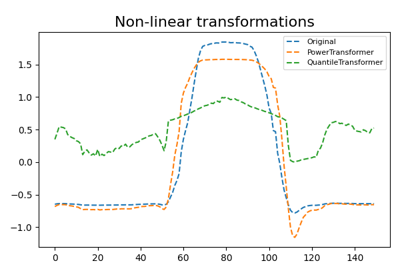pyts.preprocessing.PowerTransformer¶
-
class
pyts.preprocessing.PowerTransformer(method='yeo-johnson', standardize=True)[source]¶ Apply a power transform sample-wise to make data more Gaussian-like.
Power transforms are a family of parametric, monotonic transformations that are applied to make data more Gaussian-like. This is useful for modeling issues related to heteroscedasticity (non-constant variance), or other situations where normality is desired.
Currently, PowerTransformer supports the Box-Cox transform and the Yeo-Johnson transform. The optimal parameter for stabilizing variance and minimizing skewness is estimated through maximum likelihood.
Box-Cox requires input data to be strictly positive, while Yeo-Johnson supports both positive or negative data.
By default, zero-mean, unit-variance normalization is applied to the transformed data.
Parameters: - method : ‘yeo-johnson’ or ‘box-cox’ (default = ‘yeo-johnson’)
The power transform method. Available methods are:
- standardize : boolean (default = True)
Set to True to apply zero-mean, unit-variance normalization to the transformed output.
Notes
NaNs are treated as missing values: disregarded in
fit, and maintained intransform.References
[1] I.K. Yeo and R.A. Johnson, “A new family of power transformations to improve normality or symmetry.” Biometrika, 87(4), pp.954-959, (2000). [2] G.E.P. Box and D.R. Cox, “An Analysis of Transformations”, Journal of the Royal Statistical Society B, 26, 211-252 (1964). Examples
>>> import numpy as np >>> from pyts.preprocessing import PowerTransformer >>> X = [[1, 3, 4], [2, 2, 5]] >>> pt = PowerTransformer() >>> print(pt.transform(X)) [[-1.316... 0.209... 1.106...] [-0.707... -0.707... 1.414...]]
Methods
__init__([method, standardize])Initialize self. fit([X, y])Pass. fit_transform(X[, y])Fit to data, then transform it. get_params([deep])Get parameters for this estimator. set_params(**params)Set the parameters of this estimator. transform(X)Transform the data. -
__init__(method='yeo-johnson', standardize=True)[source]¶ Initialize self. See help(type(self)) for accurate signature.
-
fit_transform(X, y=None, **fit_params)¶ Fit to data, then transform it.
Fits transformer to X and y with optional parameters fit_params and returns a transformed version of X.
Parameters: - X : array-like, shape = (n_samples, n_timestamps)
Univariate time series.
- y : None or array-like, shape = (n_samples,) (default = None)
Target values (None for unsupervised transformations).
- **fit_params : dict
Additional fit parameters.
Returns: - X_new : array
Transformed array.
-
get_params(deep=True)¶ Get parameters for this estimator.
Parameters: - deep : bool, default=True
If True, will return the parameters for this estimator and contained subobjects that are estimators.
Returns: - params : dict
Parameter names mapped to their values.
-
set_params(**params)¶ Set the parameters of this estimator.
The method works on simple estimators as well as on nested objects (such as
Pipeline). The latter have parameters of the form<component>__<parameter>so that it’s possible to update each component of a nested object.Parameters: - **params : dict
Estimator parameters.
Returns: - self : estimator instance
Estimator instance.


